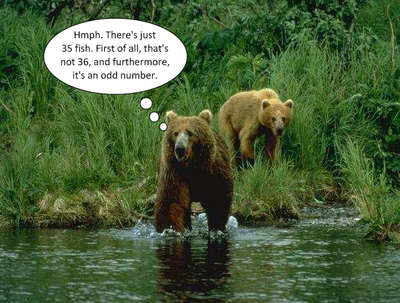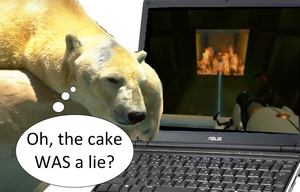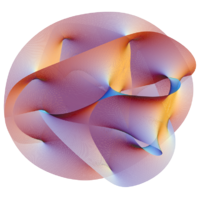You don't exist
Yes, you don't exist.
In fact, nothing exists. Except for nothing (see that section).
Go ahead, ask me about anything that you think exists.
Bears?[edit]
No, bears don't exist.
What you think is a bear is merely a spatial-visual-aural representation of a bear. It is not what is really a bear. Bears only exist in the idealistic, Platonic world where their offspring obey completely by the laws of Mendelian genetics and where there are exactly 36 fish to catch in a day.
Many philosophers, such as the Marquis de Colbert, have argued for the existence and therefore threatfulness of the bear's spatial-visual-aural representation. However, note that the bear's non-existent representation may only pose a threat to your non-existent representation, the concept of which many have failed to grasp.
Note that the bear's spatial-visual-aural representation can be split into:
- the spatial representation. This is a representation of the space the Platonic bear may take up in terms of Platonic volume measurements, with additional width, length and height measurements in Platonic metres.
- the visual representation. This varies between the consciousness-representation's perception of the visual representation.
- the aural representation. This is analogous to the visual representation.
Additional representations that the bear may take include:
- textual: this may be dissolved into visual representations of Platonic written language units.
- sensory: see visual, aural.
- temporal: this is a representation of the time a Platonic object takes up in the entire Platonic timeline.
You may refer back to this item for visual-textual representations of the definitions of the representation types.
This question?[edit]
No, that question does not exist.
You have merely given me a textual-visual representation of your query, which never exists. Your query is also in the Platonic world, where I see it is currently trying to avoid being eaten by the bears.
Some philosophers have claimed that the query is validly existent in its textual-visual manifestation in the non-Platonic world. This is true; however, this argument is fundamentally flawed when trying to prove the fundamental existence of the manifestation itself due to the fact that it is enclosed within the non-Platonic world, which is overall a manifestation of the Platonic world and therefore really does not exist. (More on the fundamental nonexistence of the universe is below.)
This computer, surely?[edit]
No, this computer you're staring at does not exist.
You (who are nonexistent) are merely gazing at a spatial-visual-sensory representation of your computer. I believe the bears are playing Portal on your computer, which has been idealised such that it has a diagonal width of exactly [SPECIFICATION STATISTIC HERE].
In fact, some have even claimed that the universe itself is a spatial-temporal manifestation of a simulation, itself running through the spatial manifestations of electronic circuits of the spatial manifestation of a computer. However, this is untrue: this computer itself would be a manifestation of a Platonic computer, and therefore the argument gets a little absurd. Thus, we have disproven this by the proof method known as reductio ad absurdum.
What about this article?[edit]
You guessed it...
...you are merely staring at a visual-textual representation of this article. The article is currently teaching the bears how to beat the 19th test chamber.
Meanwhile, note that despite the fundamental nonexistence of this article, you may still understand the purpose of this article.
This is due to the fact that the content of the Platonic counterpart of this article is itself encoded in the visual-textual representation, which is in turn decoded by your consciousness-representation, which is able to understand a manifestation of the content. Note that this argument maintains sensibility and therefore is not absurd, and therefore is safe against the reductio ad absurdum proof method.
Uncyclopedia?[edit]
No.
You are merely staring at a textual-visual representation of Uncyclopedia. Uncyclopedia has just pwned the bears at Portal.
(Note the different order of "textual" and "visual" than the previous section; this is Uncyclopedia-specific, and is very important, so don't question it.)
(I said, DON'T QUESTION IT!)
Many Uncyclopedians have been flabbergasted that such a non-fundamental part of the world (or rather the manifestation of the Platonic world) could ever be nonexistent. They have tried to come up with disproofs for the nonexistence of the Great Compendium.
1) Nobody expects the Spanish Inquisition. Although this is perfectly true, it is also rather absurdist, and therefore by reductio ad absurdum, this attempt is invalid.
2) Uncyclopedia exists because Uncyclopedians say so. This validly brings up the question of free will, not to mention freely willed existence of a thing. However, this claim implies that consciousness-representations can cause textual-visual representations of Platonic objects. This is perfectly absurd, and therefore by reductio ad absurdum, this attempt is also rendered invalid.
3) Wikipedia is a textual-visual representation of Uncyclopedia; therefore, Uncyclopedia is a Platonic object and therefore exists. This proof is flawed because it implies that textual-visual representations can only be derived from Platonic objects, which is just as much of a lie as the cake.
4) Uncyclopedia is so incredibly content-free that its textual-visual representation lacks content; therefore its representation is meaningless, which is absurd; therefore it exists. Not only is this disproof so absurd that this disproof can itself be disproven by reductio ad absurdum, but it makes untrue assumptions, such as the fact that it is "incredibly" content-free; Uncyclopedia is solely content-free, without any adjectives.
Let me guess... I don't exist.[edit]
Correct.
You are merely a visual-spatial-temporal-sensory representation of yourself. Besides, if you existed, you would be thinking, and therefore you would have realised that you didn't exist, and wouldn't be reading this article.
Oh, by the way, your Platonic counterpart still hasn't got past the 3rd level in Portal.
About 50% of the world's population (alright, %) have realised this simple fact (their own existence, not their own incompetence in Portal) and subsequently disappeared under mysterious circumstances. The rest (alright, %) have come up with perfectly invalid proofs of their own existence.
(NOTE: Yes, I know there is an excess 1%. This is no accident; 1% of the ones mysteriously disappeared have left proofs of their own existence. TAKE THAT!)
Several proofs of the existence of the self have popped up in recent years.
1) Cogito, ergo sum. Sounds deep, but it's in a horribly defunct language. This is Uncyclopedia: SPEAK ENGLISH!
1.1) Alright... I think, therefore I am. As I said, if you were thinking at all, you would have realised your own nonexistence.
2) Nobody expects the Spanish Inquisition. Too absurd.
2.1) The cake is a lie. Even worse.
3) I understand this article, therefore I exist. If you understood this article, you would realise your own nonexistence.
4) Resistance is futile. You will exist. This is called proof by intimidation, and is a completely invalid method.
Surely this universe...[edit]
...does not stand a chance.
I shall first disprove the existence of the population of the universe.
1) We know that there has to be a finite number of organisms: if there was an infinite number of organisms in the universe, they would already have died out due to overpopulation, so it would turn into a finite number -- a contradiction.
2) We know that the size of the universe is infinite: if we assume the size is a finite number n, then by the time we accurately determine n, the universe will have expanded to, say, n + 1, which is what we subsequently say n is. Since this process goes on forever due to indefinite expansion of the universe, the size of the universe approaches infinity -- a contradiction.
3) We know the population density of the universe is zero: (number of organisms)/(size of universe) = (some finite quantity)/(infinity) = 0.
4) We therefore know the population of the universe to be zero.
Therefore, the universal population is nonexistent, and any person that you may meet from time to time is merely a figment of your imagination.
Now I shall disprove the existence of the universe.
1) Suppose the universe existed.
2) Surely some organisms would inhabit the universe -- the infinite size of the universe calls for an infinite number of worlds and therefore an infinite number of inhabitable worlds.
3) Therefore there must be a finite number of organisms, at least.
4) We have just proved that there are none, however -- a contradiction.
Therefore, the universe is nonexistent.
How about nothing?[edit]
Sure, nothing exists.
Suppose nothing didn't exist. Then a double negative arises, which makes this sentence incorrect due to breaking a rule of grammar.
Therefore, the opposite has to be true, and therefore nothing exists.
However, many have attempted a disproof of the nonexistence of nothing. (Note that this would be perfectly valid because there is only a triple negative.)
1) Nobody expects the cake to be a lie. Yes we do. Case dismissed.
2) Nothing is a quantity, therefore it is a part of the universe; therefore it exists. But nothing is more of a lack of any quantity than a quantity. It is a direction, rather than a quantity. Besides, the universe does not exist; therefore, any part of the universe does not exist. Case dismissed.
3) Double negatives are allowed in certain circumstances. Therefore the above proof of the existence of nothing is invalid. Define certain circumstances.
3.1) Errr... Case dismissed.





